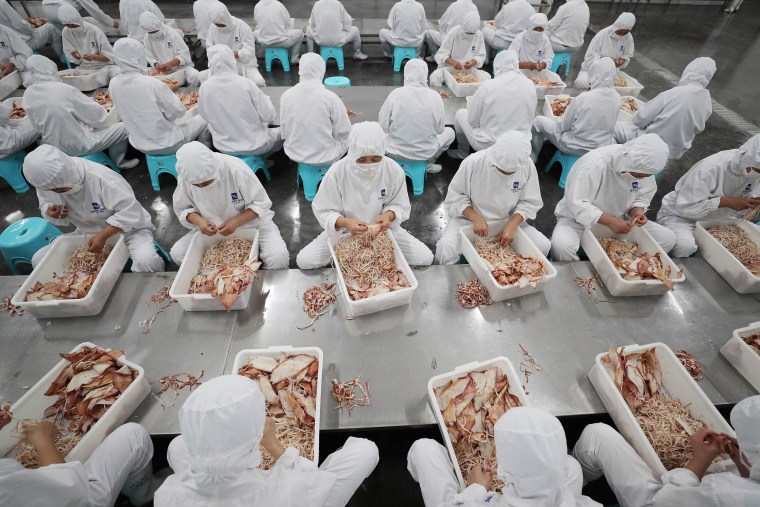BEIJING — China slammed the U.S. threat to expand tariff hikes to imports including apples, fish sticks and French doors as a "totally unacceptable" escalation of their trade battle on Wednesday and vowed to protect its "core interests."
The Trump administration raised the stakes in the growing trade dispute, threatening 10 percent tariffs on a list of $200 billion worth of Chinese imports, sending stocks lower and prompting Beijing to warn it would be forced to respond.
China's commerce ministry said it was "shocked" and would complain to the World Trade Organisation, but did not immediately say how it would retaliate.
Beijing has said it would hit back against Washington's escalating tariff measures, including through "qualitative measures," a threat that U.S. businesses in China fear could mean anything from stepped-up inspections to delays in investment approvals and even consumer boycotts.
The spiraling conflict over Chinese technology policy threatens to chill global economic growth. It stems from Washington's belief that Beijing steals or pressures companies to hand over technology and worries that plans for state-led development of Chinese champions in robots and other fields might erode American industrial leadership.
The U.S. Trade Representative announced the possible second round of tariff hikes on Tuesday targeting a $200 billion list of Chinese goods ranging from burglar alarms to mackerel. That came four days after Washington added 25 percent duties on $34 billion of Chinese goods and Beijing responded by increasing its own taxes on the same amount of American imports.
"For over a year, the Trump administration has patiently urged China to stop its unfair practices, open its market, and engage in true market competition," Trade Representative Robert Lighthizer said in announcing the proposed tariffs.
"Rather than address our legitimate concerns, China has begun to retaliate against U.S. products ... There is no justification for such action," he said in a statement.
Some U.S. business groups and lawmakers from Trump's own Republican Party were critical of the escalating tariffs.
Senate Finance Committee Chairman Orrin Hatch said the announcement "appears reckless and is not a targeted approach."
Beijing's lopsided trade balance with the United States means it will quickly run out of imports for retaliation. China imported U.S. goods worth $130 billion last year and Friday's tariff hike hit $34 billion of that, with another $16 billion cited for a possible increase.
China "cannot match fresh U.S. tariffs," Vishnu Varathan of Mizuho Bank said in a report.
Instead, its heavily regulated economy gives Beijing tools to disrupt operations for American automakers, restaurant chains and other companies that are looking to China to drive revenue growth. Regulators can deny or cancel licenses or tie up companies by launching tax, environmental or anti-monopoly investigations.
China's exports have mushroomed since it joined the World Trade Organisation in 2001, making it the world's second-largest economy and prompting widening criticism in recent years from trading partners that it has unfairly used global trade rules to its advantage.
As its dispute with Washington deepened, Beijing has been calling on other countries to support global free trade and has talked up efforts to ease investment rules. During a visit to Germany this week by Chinese Premier Li Keqiang, the countries signed business deals worth more than $23 billion.


